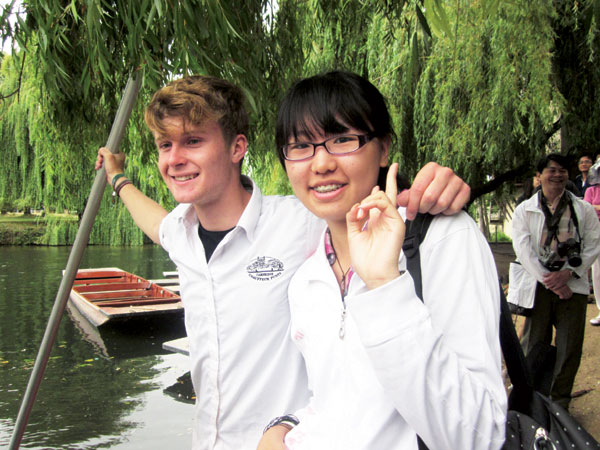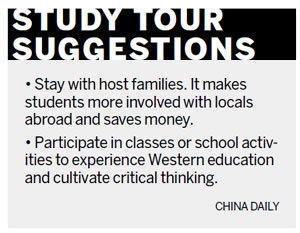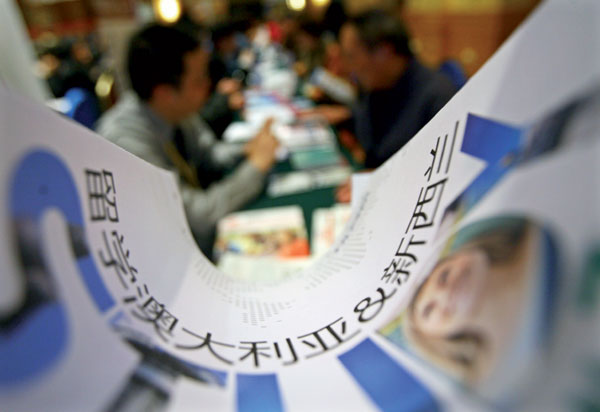Flying the nest
Updated: 2012-01-30 08:20
By Luo Wangshu (China Daily)
|
|||||||||||
|
An advertisement to promote study programs in Australia and New Zealand at a Wuhan education fair. Zhuang Yixie / for China Daily |
|
 Beijing high school student Sun Fengyue during her 2011 study tour to Cambridge. Provided to China Daily |
 |
Study tours that prepare youngsters for university courses overseas are becoming increasingly popular. Luo Wangshu reports.
Fifteen-year-old Jenny Chen from Beijing is packing her bags for a study tour of the United States.
"I can't wait to see the top universities and the Statue of Liberty," says the Tsinghua International School student, in Beijing, who intends to study in the US when she graduates.
The number of Chinese students going to overseas study camps during vacations has boomed.
"Student numbers enrolling for the global study tour at New Oriental School (NOS) have increased 10 times since 2007," says Liu Ting, director of Global Study Tour Promotion and Management Center at New Oriental Education & Technology Group Inc, one of the largest private English education providers in China. "We had 10,000 participants in 2011, compared with about 1,000 in 2007."
Liu says the study tour gives students an opportunity to live with host families, participate in school activities and immerse themselves in local culture abroad.
The global study tour is an overseas trip with peers, led by one or two teachers, costing from 30,000 yuan ($4,740) to 40,000 yuan.
The tours typically last for two to four weeks and involve travel and lessons on local culture and schools.
Luo Tao, director of Global Study Tour Department in Beijing NOS, says: "The tour provides students a great opportunity to experience classes and life abroad, in addition to providing face-to-face meetings with faculty members and students from the universities involved."
Chen Hui, manager of Global Study Tour at NOS, says the study tour is often inspirational for students.
"They followed me every second for the first three days, like babies," says Chen, who took teenage students to the United Kingdom in 2010, as a teacher. "But they grew up quickly in the new environment and were soon able to cope on their own."
Chen recalls an occasion when her students got separated from her at Westfield Mall, the largest shopping center in Europe, but finally managed to find their way back to the meeting point.
Chen says the students developed in many aspects because of the study tour experience.
Liu Sai, mother of a former student participant, agrees with this assessment.
"The tour eliminated my daughter's fear of living and studying abroad," Liu says. "She has become more confident and wanted to stay longer in the UK by the end of the trip."
Another mother, Liu An'an, has been sending her son on study tours abroad since he was at primary school.
"My focus is on educating my son to be an independent man."
Her 13-year-old is about to take off on his third study tour, this time to the US.
"He rang me once during his tour to Australia in 2011," Liu says. "But he told me he wouldn't call during the two-week tour this time. He has grown up."
However, Xiao Chuan, a professor of education at Beijing Normal University, has some reservations about the benefits of short-term study tours.
"The ability of students to absorb knowledge depends on their existing knowledge and experience," Xiao explains. "An overseas tour won't make a huge difference."
Even so, Jenny Chen is excited about her first trip to the US.
"I'd like to visit the School of Journalism at Columbia University in New York because my dream is to be a television anchor," Chen says.
"I've heard Columbia is one of the best universities in the world."
Today's Top News
Rescuers race against time for quake victims
Telecom workers restore links
Coal mine blast kills 18 in Jilin
Intl scholarship puts China on the map
More bird flu patients discharged
Gold loses sheen, but still a safe bet
US 'turns blind eye to human rights'
Telecom workers restore links
Hot Topics
Lunar probe , China growth forecasts, Emission rules get tougher, China seen through 'colored lens', International board,
Editor's Picks

|

|

|

|

|

|






